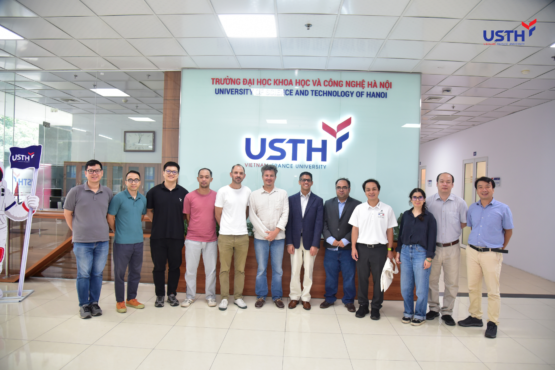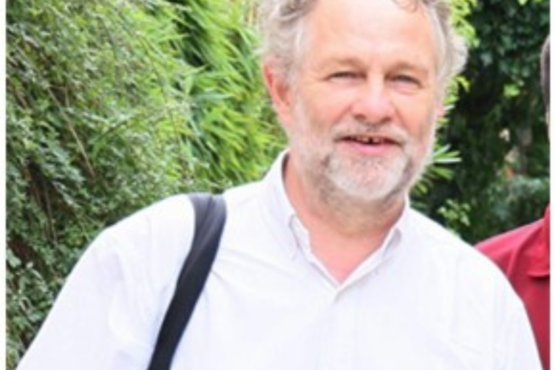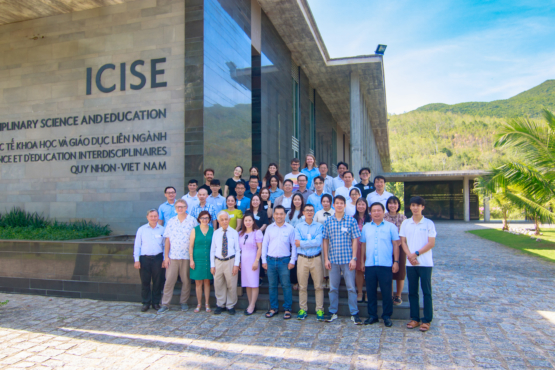From September 11 to 15, 2023, the Department of Space and Applications (USTH) participated in the organization of the “3rd Vietnam School of Earth Observation” (Vietnam School of Earth Observation, abbreviated as VSEO) in Quy Nhon, Vietnam, together with domestic and foreign partners.
In 2018, VSEO was established by French and Vietnamese scientists, with Dr. Yannick Giraud-Héraud, the former Director of the Department of Space and Applications at USTH, playing an important role. VSEO serves as both a hub for nurturing and spreading scientific knowledge and a bridge for enhancing collaboration and fostering connections between domestic and international institutes in the field of Earth Observation. One key feature of VSEO is its ability to draw participants from various age groups, including experienced experts as well as students in the initial stages of their research careers.

This year, VSEO-3 was co-organized by the International Center for Interdisciplinary Science and Education (ICISE), The National Centre for Space Studies (CNES), Institute of Research for Development (IRD), France, the Department of Space and Applications (USTH), and other sponsors.
Following the success of VSEO-1 (2018) on “Atmospheric Remote Sensing and molecular spectroscopy”, VSEO-2 (2019) on “Remote Sensing in Flood and Wetland Research”, after 3 years affected by the Covid pandemic , VSEO-3 has returned with the topic “SAR remote sensing of land surface in Vietnam”. The main purpose of VSEO-3 is to teach theory and practice to scientists and young researchers in Vietnam and Southeast Asia on the application of Radar data to monitor rice and forest changes in the area.

VSEO-3’s lecturers included leading scientists in the field of remote sensing and Earth observation from France and Vietnam. Specifically, on the French side, there was the participation of Dr. Linda Tomasini (CNES); Dr. Le Toan Thuy, Dr.. Bouvet Alexandre (CESBIO Center, Toulouse); Dr. Dounias Edmond, Dr. Ferrant Sylvain (IRD); Dr. Poupée Marc (National School of Geographic Sciences); Dr. Doblas Juan, Dr. Mermoz Stéphane (GlobEO, Toulouse). On the Vietnamese side, there was the participation of Assoc. Prof. Ngo Duc Thanh (USTH), Dr. Lam Dao Nguyen (Vietnam National Space Center), Dr. Nguyen Huu Quyen (Institute of Hydrometeorology and Climate Change).
In addition, VSEO-3 attracted 30 students, lecturers, researchers from France, Vietnam, Thailand, Philippines, Malaysia, Cambodia, … It fostered a multicultural international environment, emphasizing the expansion of connection and cooperation networks, which became the highlight of the VSEO.
During the week of the event, VSEO-3 focused on theoretical and practical instruction on using Radar Remote Sensing in studying the Earth’s surface, especially in monitoring rice and forests. The experts bring “valuable” knowledge and information with a high level of expertise on Radar image processing tools, and algorithms on specialized software and cloud computing platforms. It helped to save time, costs and to adapt to various research purposes.
At the same time, the VSEO-3’s participants had opportunities to observe the structure of the mangrove forest through the field trip in the Thi Nai lagoon area and Lang Song church rice field. They explored the process of growing and caring for rice plants based on the presentations of the experts and those who directly monitor the mangrove forest. The knowledge from the field trip contributed to expanding the understanding of vegetation change processes received on Radar images.


Besides theory, the participants practiced monitoring annual deforestation and rice zoning in the Mekong Delta using Radar data on a cloud computing platform. From the above knowledge, they enthusiastically discussed the possibility of applying Radar images for research on natural resources and the environment. It promises to be a premise for many valuable ideas and research in the future.
The ending of VSEO-3 brought many emotions to participants. They highly appreciated it and some participants affirmed that it was the most attractive and meaningful summer school they had ever joined. It is not only a “realm” of science but also a “bridge” in cooperation, knowledge exchange, and exchange both domestically and internationally.

On behalf of the Organizing Committee, Assoc. Prof Ngo Duc Thanh stated that VSEO-3 was successful. At the same time, he also expressed his sincere thanks to the sponsors, lecturers, and especially the participants who contributed to the success of this year’s summer school. With the support of partners and scientists, the VSEO Organizing Committee commits to the ongoing development of VSEO in the upcoming years.




